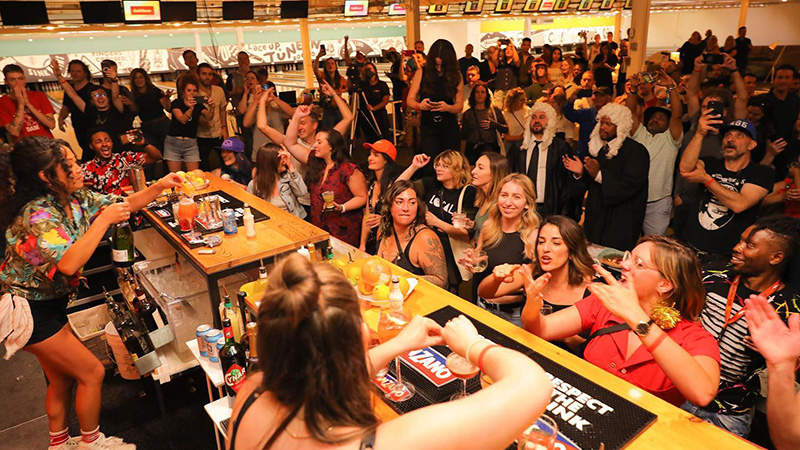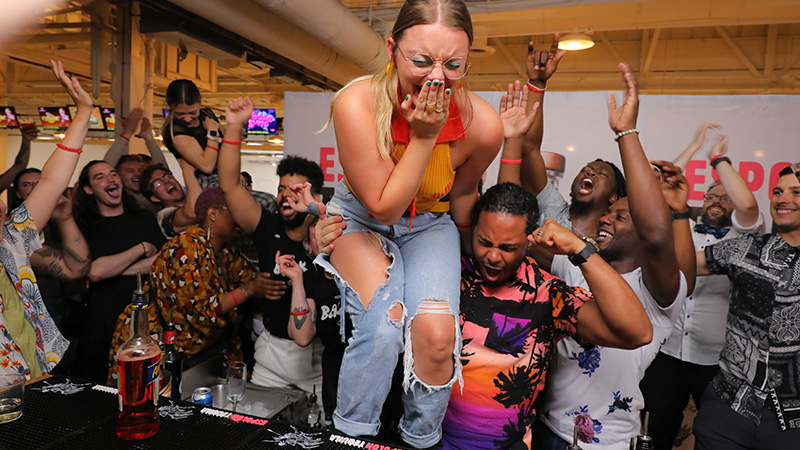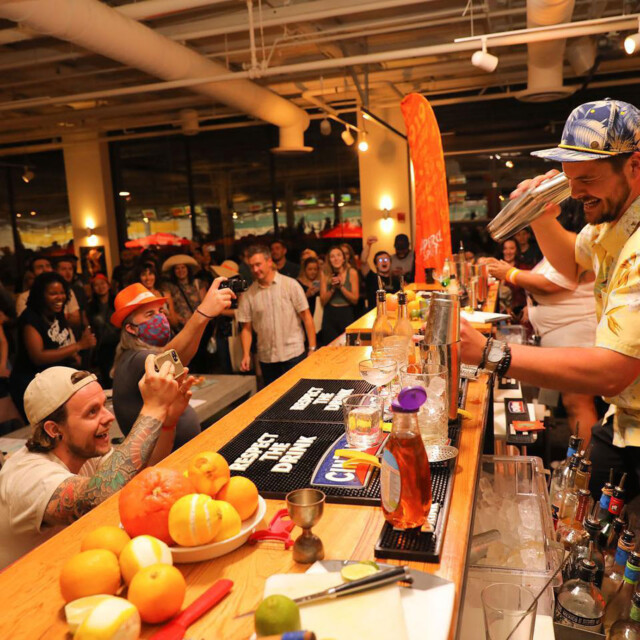The Rochester Cocktail Revival is celebrating its 10th anniversary this year.
Did you know it existed?
When one thinks of American cocktail conventions, drinking destinations like New Orleans and Portland, Ore., likely first come to mind. But this festival — which for the entire second week of June will take over the social life of “Flower City” — is one of the most enduring such events in the nation. It may, in fact, be the longest-running, city-centric cocktail convention under the same management in the country.
Well, you might well retort, that may be, but how big could such a gathering be? How many cocktail programs are there in Rochester, N.Y., a city of only 200,000, only the fourth-largest metropolis in New York State, and the 108th in the United States?
At least 28. Anyway, that’s the number participating in the 2023 Rochester Cocktail Revival, all taking part in a wide array of spirited dinners, parties, and seminars. But 28 actually represents a cut-off point. The festival’s founder, Chuck Cerankosky, had to turn some bars and restaurants away this year.
That signifies significant progress. When the festival was launched in 2014, there were a total of six bars. And two of those bars were actually owned by Cerankosky himself.
This information still comes as news to a lot of people in the cocktail world. When cocktail writer and historian Noah Rothbaum was first invited to RCR in 2015, his response was, “That sounds great. Are there cocktail bars in Rochester?”
That’s still pretty much the reaction of anyone unfamiliar with the festival.
“We’re super loud for this one week of the year,” says Leah Stacy, associate producer of RCR. “It’s rare to find one that is this old and long-running. It’s a week in a mid-sized city. I think we stand out in a number of ways.”
“These people were barhopping, but it’s all cocktail bars. You couldn’t do that two years ago. Something is happening here.”
The festival might never have happened had Cerankosky, a native of Cleveland, not suddenly found himself a young father in 1999 while attending the Rochester Institute of Technology. To support his new family, he took a position as a regional manager of Java’s, a local coffee chain. When plans to open a Java’s in Brooklyn fell through, he and his partner, Michael Calabrese, instead opened the restaurant Good Luck in a former fabric store in 2008. A third partner, Dan Martello, was handling the food. Cerankosky figured, with his coffee background, he was the beverage guy.

“Let’s have a cocktail program like no other,” he recalls thinking, “because no one in Rochester at the time was doing anything worthwhile with cocktails.”
He schooled himself, studying books like Dale DeGroff’s “Craft of the Cocktail,” reading New York Times articles on cocktails and spirits, studying the spirits list on Death & Co.’s website, and visiting The Violet Hour in Chicago. (Fun fact: Death & Co. founder Dave Kaplan also went to school in Rochester. Cerankosky, who also used to DJ, once spun records at a party at Kaplan’s house.)
He opened Good Luck with a menu of half original drinks, half classic cocktails. It wasn’t easy being a lone wolf in a new market.
“They’d put the menu down and it was like you punched them,” he remembers. “’How dare you! I don’t need a menu. I’m just going to order my drink.’ It took a decade for Good Luck to teach people that it was OK to stir a Martini.”
Slowly, things changed. After Good Luck, another cocktail bar, Cheshire, opened. Then Cerankosky opened Cure in 2012. Momentum was building. Then, one night at Cure, a couple came in. They had plans that night to move on to Good Luck, Cheshire, and The Daily Refresher, another cocktail bar.
“These people were barhopping, but it’s all cocktail bars,” says Cerankosky. “You couldn’t do that two years ago. Something is happening here.” Soon after, he hatched the idea of staging a cocktail convention.
“When people come here from larger markets, it’s almost like a vacation from reality. Mid-sized cities have the advantage of landscape and intimacy when it comes to hosting events.”
Again, it wasn’t easy. Cerankosky remembered the older generation of Rochester bar owners as a cautionary tale. “They all hated each other,” he says. “They couldn’t stand to be in the same room together.” He didn’t want that to happen again. But it took some coaxing to bring his contemporaries in drink-slinging around. “I think we had to have three meetings just to make sure we all liked each other,” he says.
The RCR hit the ground running. Its first guest speaker was none other than the celebrated barman Dale DeGroff, whose book Chuck has been studying. In the years to come, Cerankosky managed to lure such bar-world luminaries as David Wondrich, Gary Regan, Dave Arnold, Ivy Mix, Jeff Berry, and Rothbaum. (Full disclosure: I have spoken at RCR multiple times.)
Cerankosky, who is naturally self-effacing, knows it wasn’t the charm of the city or his powers of persuasion that convinced the cream of the cocktail world to take a sidetrack to Rochester. No, he had a local ace in the hole.

“Joe Fee was the facilitator,” he says. Fee was the face of the Fee Brothers bitters company, a venerable Rochester institution that dates back to 1864. Prior to the festival, Fee Brothers was the only reason anyone in the cocktail world gave Rochester a thought. And everybody knew Joe Fee, a garrulous family scion. Tall, gangly and always wearing a too-small safari hat, Fee cut a familiar figure at Tales of the Cocktail and other drink confabs.
“I don’t think that, without Joe, these guys would have come,” Cerankosky says, “because he was an elder statesman.”
Joe Fee died in 2020 at the age of 55. And yet RCR continues to attract big crowds and name talent. Rothbaum thinks he knows why.
“It’s more than just: airport, hotel, speech, room service, airport,” he says. “It still feels homespun and welcoming just as it did years ago. Many nights end with having dinner with Chuck. It’s homey that way.”
Donny Clutterbuck, who helps coordinate the seminars, and has run the bar at Cure for nearly a decade, has lived and worked in both New York City and Rochester. As such, he possesses special intel on what Rochester has to offer to big-city types.
“When people come here from larger markets, it’s almost like a vacation from reality,” he says. “Mid-sized cities have the advantage of landscape and intimacy when it comes to hosting events.”
He also offers some insight as to why RCR has survived and thrived this long, when so many other, higher-profile cocktail festivals have failed in the past decade — and why it’s in no danger of suddenly imploding. The convention is not viewed by any of its participants as a stepping stone or springboard to something bigger. Rochester cocktailians are at RCR for Rochester. The convention is its own endgame, a way of celebrating the local cocktail scene.
“One thing Good Luck cannot be is new again,” observes Cerankosky. “It’s 15 years old. But what it can always do is be relevant. Once a year, we’re all relevant on the same level.”
